习俗礼仪中英文对照
中国礼仪习俗英语作文
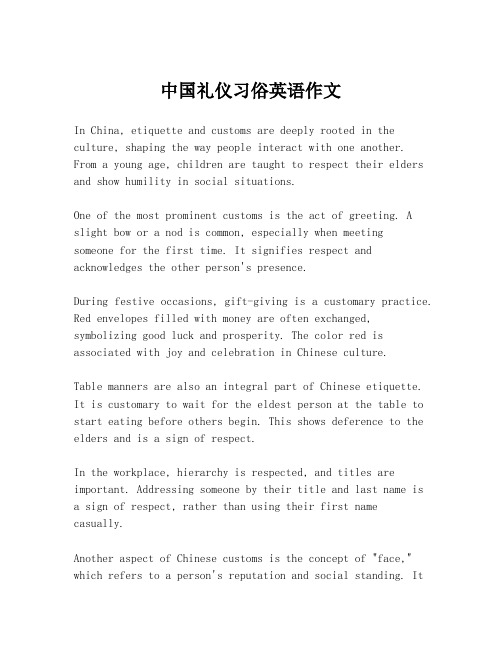
中国礼仪习俗英语作文In China, etiquette and customs are deeply rooted in the culture, shaping the way people interact with one another. From a young age, children are taught to respect their elders and show humility in social situations.One of the most prominent customs is the act of greeting. A slight bow or a nod is common, especially when meeting someone for the first time. It signifies respect and acknowledges the other person's presence.During festive occasions, gift-giving is a customary practice. Red envelopes filled with money are often exchanged, symbolizing good luck and prosperity. The color red is associated with joy and celebration in Chinese culture.Table manners are also an integral part of Chinese etiquette. It is customary to wait for the eldest person at the table to start eating before others begin. This shows deference to the elders and is a sign of respect.In the workplace, hierarchy is respected, and titles are important. Addressing someone by their title and last name is a sign of respect, rather than using their first name casually.Another aspect of Chinese customs is the concept of "face," which refers to a person's reputation and social standing. Itis essential to avoid embarrassing someone in public, as it can cause a loss of face.In conclusion, Chinese etiquette and customs are a reflection of the country's rich history and cultural values. They provide a framework for social harmony and respect, ensuring that interactions are conducted with grace and consideration.。
习俗礼仪中英文对照
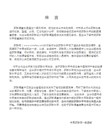
Proper use of language is an art. Speak of the voice, tone, speed, pronunciation talk directly affect the results. Under normal circumstances, talk to user-friendly, giving each other a pleasant feeling as good, too dirty or too high-tone tend to hinder the individual's image. In particular, note that when greeting each other as far as possible not to use with their professional, highly job-related vocabulary, so as not to understand each other. Then say something profound truth, others do not think people great conversation. The topic of religion and politics often involve personal position, thus such words as little as possible reach and easily talk about the events of that day is still possible. Generally speaking, with each other to talk about literature, art, sports topics, the obstacles will be less, but forbidden to each other to express their erudition. In addition, the excessive use of speaking other languages are also uneducated performance. Standard practice is to first according to their situation (age, gender) for the corresponding topic, the use of educated language, easy to talk to. The Japanese believe that, regardless of a person learning have contributed much, if not understand a wide range of social knowledge, unreasonable ways of the world are not educated people. 正确使用语言是一种艺术。说话时的声音、口气、速度、发音等直接影响谈话效果。一般情况下,谈话以通俗易懂、给对方以愉快的感觉为好,过分卑下或者过分高腔调都有碍个人的形象。特别要注意的是,问候对方时尽量不要使用与自己的专业、职务有关的高深的词汇,以免对方费解。这时讲一些高深的道理,旁人并不会觉得谈话人了不起。宗教与政治的话题往往涉及个人的立场,所以这类话尽可能少触及,轻松地谈一谈当天发生的事件还是可以的。一般说来,与对方谈文学、艺术、体育方面的话题,障碍会少一些,但严禁向对方表示自己的博学。此外,过多地使用外语交谈也是没有教养的表现。标准的做法是,首先根据对方的情况(年龄、性别)提出相应的话题,使用有教养的语言,轻松地交谈。日本人认为,无论一个人在学问上有多大的建树,如果不懂广泛的社会知识,不通世故都不是有教养的人。
婚礼习俗中英介绍

结婚前先订婚,仪式简单,一般由女方的家长宴请男方的家长及兄弟姐妹,也可同时邀请 其他亲戚、甚至一两名好友出席。婚礼也已逐渐简化,但仍不失为最隆重的家庭节日, 带有庄严神圣的色彩。婚礼由市长或他的一名副手主持,习惯上是在周二、四、五、 六早9时至下午5时之间。婚后大宴宾客。
日本婚礼:传统的道教
相关词汇,记一记吧
wedding ceremony结婚典礼 wedding anniversary结婚纪念日 bride新娘
bridegroom or groom新郎
officiator主婚人 pastor牧师 groomsman伴郎 bridesmaid伴娘 honeymoon蜜月
wedding reception 婚宴 register office 结婚登记处 trousseau[‘tru:səu, tru:’səu]嫁妆 usher['ʌʃə]引宾员 vows 婚誓 say one‘s vows 立下婚誓 marriage certificate [sə'tifikeit]结婚证 guest 来宾 marriage after divorce 再婚 wedding march 婚礼进行曲 mixed marriage 涉外婚姻;跨国婚姻
在传统的日本道教仪式上人们供奉kami存在于自然界的神灵。在举行婚礼时,神职人员祈 求神灵保佑新婚夫妻。仪式的最后一项是“共饮青酒”,即参加婚礼的人共同分享盛 在三只扁平杯子中的米酒。这三个杯子从下往上依次骡放,新郎拿起第一个杯子,啜 三口酒,然后传给新娘,新娘也连续啜饮三口酒,再将酒杯依次传给其他亲友。然后 再开始喝第二杯和第三杯酒。
4.撑红伞、撒米:由伴娘撑红色伞伴新娘新郎出门,并且会边走边撒米给鸡吃,以免鸡啄 到新娘。 5.绕吉祥路:迎接新娘的车必须绕着市区的吉祥路名的路走一圈。 6.过门:过门指新娘由女家出门后正式踏入男家,拜见翁姑及男家其他长辈。 7.婚礼:到酒店举行仪式,有司仪会主持仪式。 8.敬客:酒宴开始之后等到上鱼的时候,新娘换上传统的龙凤褂给客敬茶。 9.入洞房:酒宴结束后新人会和一些朋友开始去新房参观或者娱乐。 10.回门:三朝回门指在婚后第三天,新妇由夫婿陪同,带备烧猪及礼品回娘家祭祖。
中国习俗礼仪作文英文
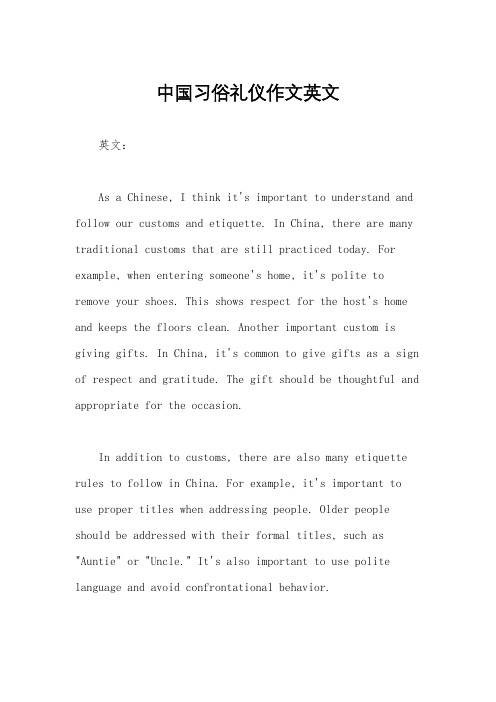
中国习俗礼仪作文英文英文:As a Chinese, I think it's important to understand and follow our customs and etiquette. In China, there are many traditional customs that are still practiced today. For example, when entering someone's home, it's polite to remove your shoes. This shows respect for the host's home and keeps the floors clean. Another important custom is giving gifts. In China, it's common to give gifts as a sign of respect and gratitude. The gift should be thoughtful and appropriate for the occasion.In addition to customs, there are also many etiquette rules to follow in China. For example, it's important to use proper titles when addressing people. Older people should be addressed with their formal titles, such as "Auntie" or "Uncle." It's also important to use polite language and avoid confrontational behavior.I think these customs and etiquette rules are important because they help to build strong relationships and show respect for others. By following these rules, we can avoid misunderstandings and show our appreciation for others.中文:作为一个中国人,我认为了解和遵守我们的习俗和礼仪非常重要。
中国礼仪和习俗的英语作文
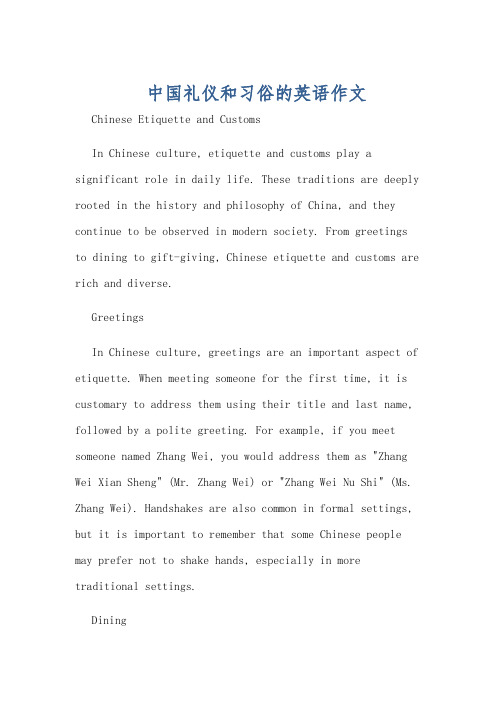
中国礼仪和习俗的英语作文Chinese Etiquette and CustomsIn Chinese culture, etiquette and customs play a significant role in daily life. These traditions are deeply rooted in the history and philosophy of China, and they continue to be observed in modern society. From greetings to dining to gift-giving, Chinese etiquette and customs are rich and diverse.GreetingsIn Chinese culture, greetings are an important aspect of etiquette. When meeting someone for the first time, it is customary to address them using their title and last name, followed by a polite greeting. For example, if you meet someone named Zhang Wei, you would address them as "Zhang Wei Xian Sheng" (Mr. Zhang Wei) or "Zhang Wei Nu Shi" (Ms. Zhang Wei). Handshakes are also common in formal settings, but it is important to remember that some Chinese people may prefer not to shake hands, especially in moretraditional settings.DiningDining etiquette in China is also highly valued. When eating at a traditional Chinese restaurant or attending a formal meal, it is important to wait for the host to start eating before you begin. It is also customary to serve others before serving yourself and to use chopsticks and a spoon to eat. Additionally, it is polite to leave a small amount of food on your plate to show that you have been served enough. Finally, when toasting, it is respectful to hold your glass lower than the person you are toasting to show humility and respect.Gift-GivingGift-giving is a common practice in Chinese culture, and there are specific customs and etiquette associated with it. When giving a gift, it is important to present it with both hands as a sign of respect. Additionally, it is customaryto refuse a gift several times before accepting it, as away of showing humility and modesty. When receiving a gift, it is polite to wait until you are alone to open it, as a sign of respect for the giver.Weddings and FuneralsIn Chinese culture, weddings and funerals are important ceremonies that are surrounded by specific customs and etiquette. At a wedding, it is customary to give red envelopes containing money as a gift to the newlyweds. At a funeral, it is important to wear somber and respectfulattire and to bring white flowers as a sign of mourning.Now let's switch to Chinese:中国礼仪和习俗在中国文化中,礼仪和习俗在日常生活中起着重要的作用。
文明礼仪与习俗英语作文附上中文翻译
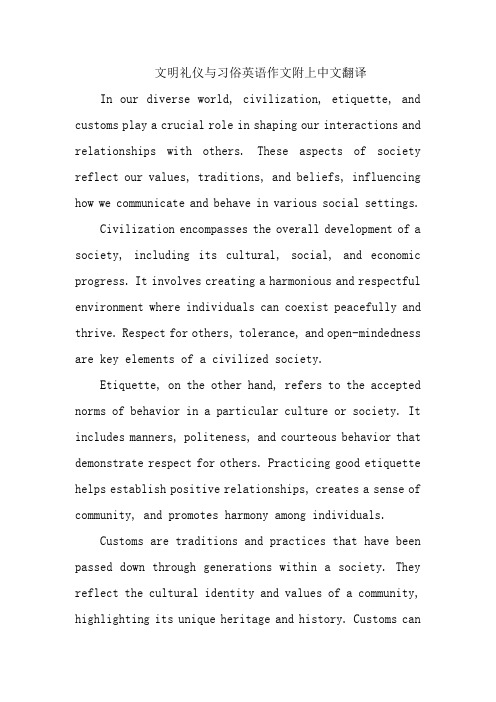
文明礼仪与习俗英语作文附上中文翻译In our diverse world, civilization, etiquette, and customs play a crucial role in shaping our interactions and relationships with others. These aspects of society reflect our values, traditions, and beliefs, influencing how we communicate and behave in various social settings.Civilization encompasses the overall development of a society, including its cultural, social, and economic progress. It involves creating a harmonious and respectful environment where individuals can coexist peacefully and thrive. Respect for others, tolerance, and open-mindedness are key elements of a civilized society.Etiquette, on the other hand, refers to the accepted norms of behavior in a particular culture or society. It includes manners, politeness, and courteous behavior that demonstrate respect for others. Practicing good etiquette helps establish positive relationships, creates a sense of community, and promotes harmony among individuals.Customs are traditions and practices that have been passed down through generations within a society. They reflect the cultural identity and values of a community, highlighting its unique heritage and history. Customs caninclude rituals, ceremonies, celebrations, and everyday practices that contribute to the richness and diversity of a culture.In conclusion, civilization, etiquette, and customs are essential aspects of human interaction and societal cohesion. By upholding these values and traditions, we can foster mutual respect, understanding, and unity among individuals from different backgrounds. Embracing and celebrating our diversity while respecting the customs and etiquette of others can lead to a more harmonious and inclusive society.中文翻译:在我们多元化的世界中,文明礼仪与习俗在塑造我们与他人的互动和关系方面起着至关重要的作用。
中国的习俗和礼仪英语作文
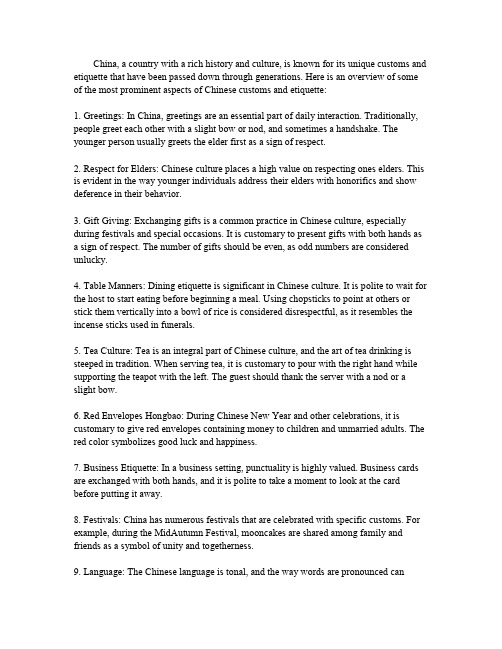
China, a country with a rich history and culture, is known for its unique customs and etiquette that have been passed down through generations. Here is an overview of some of the most prominent aspects of Chinese customs and etiquette:1. Greetings: In China, greetings are an essential part of daily interaction. Traditionally, people greet each other with a slight bow or nod, and sometimes a handshake. The younger person usually greets the elder first as a sign of respect.2. Respect for Elders: Chinese culture places a high value on respecting ones elders. This is evident in the way younger individuals address their elders with honorifics and show deference in their behavior.3. Gift Giving: Exchanging gifts is a common practice in Chinese culture, especially during festivals and special occasions. It is customary to present gifts with both hands as a sign of respect. The number of gifts should be even, as odd numbers are considered unlucky.4. Table Manners: Dining etiquette is significant in Chinese culture. It is polite to wait for the host to start eating before beginning a meal. Using chopsticks to point at others or stick them vertically into a bowl of rice is considered disrespectful, as it resembles the incense sticks used in funerals.5. Tea Culture: Tea is an integral part of Chinese culture, and the art of tea drinking is steeped in tradition. When serving tea, it is customary to pour with the right hand while supporting the teapot with the left. The guest should thank the server with a nod or a slight bow.6. Red Envelopes Hongbao: During Chinese New Year and other celebrations, it is customary to give red envelopes containing money to children and unmarried adults. The red color symbolizes good luck and happiness.7. Business Etiquette: In a business setting, punctuality is highly valued. Business cards are exchanged with both hands, and it is polite to take a moment to look at the card before putting it away.8. Festivals: China has numerous festivals that are celebrated with specific customs. For example, during the MidAutumn Festival, mooncakes are shared among family and friends as a symbol of unity and togetherness.9. Language: The Chinese language is tonal, and the way words are pronounced canchange their meaning. Politeness levels are also embedded in the language, with different forms used when addressing people of higher or lower status.10. Modesty: Modesty is a virtue in Chinese culture. It is common for people to downplay their achievements and abilities, and excessive boasting is generally frowned upon.Understanding and respecting these customs and etiquette is crucial for anyone wishing to engage with Chinese society, whether for business or personal relationships. These practices not only reflect the cultural values of respect, harmony, and tradition but also contribute to the rich tapestry of Chinese social life.。
中国文化中英文对照
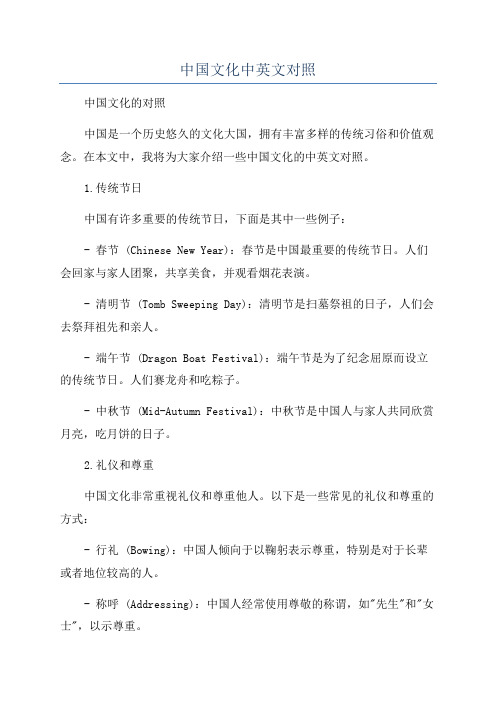
中国文化中英文对照中国文化的对照中国是一个历史悠久的文化大国,拥有丰富多样的传统习俗和价值观念。
在本文中,我将为大家介绍一些中国文化的中英文对照。
1.传统节日中国有许多重要的传统节日,下面是其中一些例子:- 春节 (Chinese New Year):春节是中国最重要的传统节日。
人们会回家与家人团聚,共享美食,并观看烟花表演。
- 清明节 (Tomb Sweeping Day):清明节是扫墓祭祖的日子,人们会去祭拜祖先和亲人。
- 端午节 (Dragon Boat Festival):端午节是为了纪念屈原而设立的传统节日。
人们赛龙舟和吃粽子。
- 中秋节 (Mid-Autumn Festival):中秋节是中国人与家人共同欣赏月亮,吃月饼的日子。
2.礼仪和尊重中国文化非常重视礼仪和尊重他人。
以下是一些常见的礼仪和尊重的方式:- 行礼 (Bowing):中国人倾向于以鞠躬表示尊重,特别是对于长辈或者地位较高的人。
- 称呼 (Addressing):中国人经常使用尊敬的称谓,如"先生"和"女士",以示尊重。
- 饮食礼仪 (Dining Etiquette):在中国,礼仪是饮食文化中不可缺少的一部分。
例如,在用筷子吃饭时,不应该插在饭碗中立起来,因为这会被视为不吉利的行为。
3.文物和建筑中国拥有世界上许多著名的文物和建筑,代表着悠久的历史和独特的文化。
- 长城 (Great Wall):长城是中国最著名的建筑之一,也是世界七大奇迹之一、它是中国古代的防御工事,总长超过21,000公里。
- 故宫 (The Forbidden City):故宫是位于北京的一座宫殿建筑,曾是明清两代24位皇帝的居住地,也是中国历史最长久、规模最大的古代宫殿建筑。
- 兵马俑 (Terracotta Warriors and Horses):兵马俑是位于西安的陶制兵器和马匹的雕像,是中国第一位皇帝秦始皇的陪葬品。
风俗习惯之世界各地的文化禁忌中英文对照版
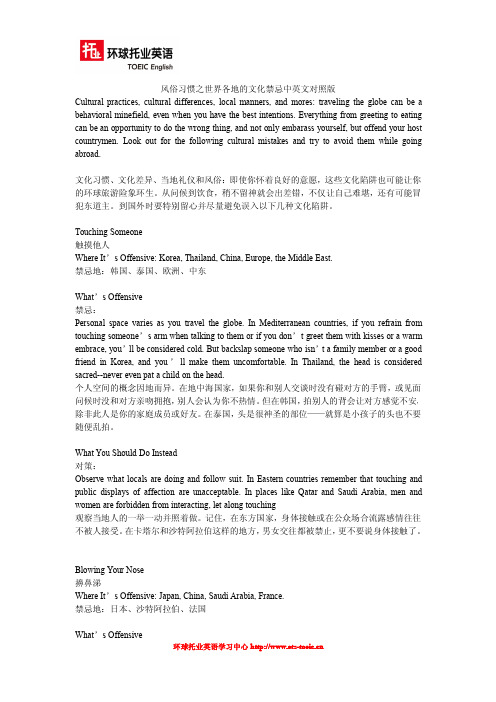
禁忌:
环球托业英语学习中心
Take off your shoes when arriving at the door of a London dinner party and the hostess will find you uncivilized, but fail to remove your shoes before entering a home in Asia, Hawaii, or the Pacific Islands and you ’ ll be considered disrespectful. Not only does shoe removal very practically keeps sand and dirt out of the house, it’s a sign of leaving the outside world behind. 到伦敦人家里参加宴会时脱掉鞋子,女主人会认为你不文明,但去亚洲、夏威夷或太平洋群 岛的居民家中不脱鞋却被认为失礼。脱掉鞋子不仅把沙粒与尘土留在了门外,更意味着把外 面的世界抛之脑后。
Talking Over Dinner 就餐时谈话 Where It’s Offensive: Africa, Japan, Thailand, China, Finland. 禁忌地:非洲、日本、泰国、芬兰
What’s Offensive 禁忌: In some countries, like China, Japan, and some African nations, the food’s the thing, so don’t start chatting about your day’s adventures while everyone else is digging into dinner. You’ll likely be met with silence--not because your group is unfriendly, but because mealtimes are for eating, not talking. Also avoid conversations in places a country might consider sacred or reflective--churches in Europe, temples in Thailand, and saunas in Finland. 在日本和一些非洲国家,吃饭就是吃饭,所以当其他人都在大快朵颐时,不要谈论你当天的 经历。你可能会遭遇沉默——这并非你的同伴不友好,而是因为就餐时间只应吃饭,无需交 谈。也要避免在一些被认为是神圣或需要沉思的地方谈话——比如欧洲的教堂、泰国的庙宇 和芬兰的桑拿浴室。
介绍中国礼仪习俗英语作文
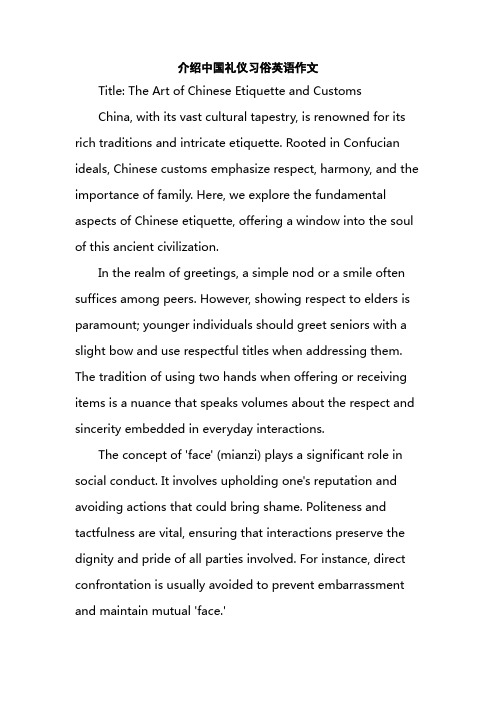
介绍中国礼仪习俗英语作文Title: The Art of Chinese Etiquette and CustomsChina, with its vast cultural tapestry, is renowned for its rich traditions and intricate etiquette. Rooted in Confucian ideals, Chinese customs emphasize respect, harmony, and the importance of family. Here, we explore the fundamental aspects of Chinese etiquette, offering a window into the soul of this ancient civilization.In the realm of greetings, a simple nod or a smile often suffices among peers. However, showing respect to elders is paramount; younger individuals should greet seniors with a slight bow and use respectful titles when addressing them. The tradition of using two hands when offering or receiving items is a nuance that speaks volumes about the respect and sincerity embedded in everyday interactions.The concept of 'face' (mianzi) plays a significant role in social conduct. It involves upholding one's reputation and avoiding actions that could bring shame. Politeness and tactfulness are vital, ensuring that interactions preserve the dignity and pride of all parties involved. For instance, direct confrontation is usually avoided to prevent embarrassment and maintain mutual 'face.'Another cornerstone of Chinese etiquette is the importance given to hospitality. Whether hosting or attending a gathering, the rituals surrounding it are steeped in tradition. When invited to a home, it is customary to bring a gift as a sign of appreciation. During meals, the act of serving tea or filling someone's bowl before one's own is a display of thoughtfulness and generosity.Celebrations in China, such as weddings and the Chinese New Year, are steeped in tradition and symbolism. For example, red adornments and envelopes filled with money (hongbao) are emblematic of luck and prosperity. Participating in these events requires an understanding of the significance behind each gesture and gift.In conclusion, Chinese etiquette and customs offer a refined roadmap for social interaction, reflecting a culture that values respect, harmony, and mutual dignity. While these practices may vary across the diverse regions of China, their underlying principles echo the nation's ethos—an intricate dance of tradition and propriety that enriches the human experience. Understanding and respecting these customs is not only a sign of cultural sensitivity but also a bridge to deeper intercultural connections and understanding.。
八下英语作文向朋友介绍中国的礼仪习俗
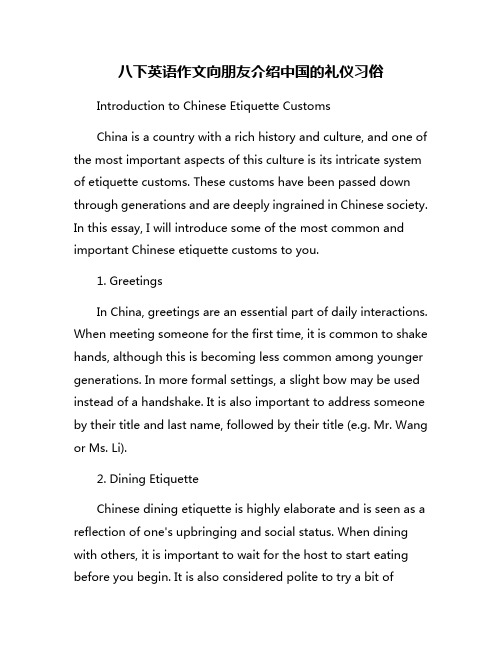
八下英语作文向朋友介绍中国的礼仪习俗Introduction to Chinese Etiquette CustomsChina is a country with a rich history and culture, and one of the most important aspects of this culture is its intricate system of etiquette customs. These customs have been passed down through generations and are deeply ingrained in Chinese society. In this essay, I will introduce some of the most common and important Chinese etiquette customs to you.1. GreetingsIn China, greetings are an essential part of daily interactions. When meeting someone for the first time, it is common to shake hands, although this is becoming less common among younger generations. In more formal settings, a slight bow may be used instead of a handshake. It is also important to address someone by their title and last name, followed by their title (e.g. Mr. Wang or Ms. Li).2. Dining EtiquetteChinese dining etiquette is highly elaborate and is seen as a reflection of one's upbringing and social status. When dining with others, it is important to wait for the host to start eating before you begin. It is also considered polite to try a bit ofeverything on the table and to compliment the chef. In addition, it is customary to leave a little food on your plate to show that you are full.3. Gift GivingGift giving is an important part of Chinese culture and is often used to show respect, gratitude, or to strengthen relationships. When giving a gift, it is important to present it with both hands and to show humility. It is also common to refuse a gift multiple times before accepting it, as a sign of politeness.4. Business EtiquetteIn the business world, Chinese etiquette customs are particularly important. Business meetings often start with small talk and the building of a personal relationship before business matters are discussed. It is also common to exchange business cards, with both hands and with a slight bow. It is important to show respect for those higher in rank and to avoid confrontation or direct criticism in front of others.5. Festivals and CelebrationsChinese festivals and celebrations are a big part of Chinese culture, and there are many customs associated with these events. During Chinese New Year, for example, it is customary towear red clothes, give red envelopes (hongbao) with money inside, and visit family and friends. During the Mid-Autumn Festival, it is common to eat mooncakes and gaze at the full moon.In conclusion, Chinese etiquette customs are an important part of Chinese culture and play a significant role in daily interactions, social relationships, and business dealings. By understanding and respecting these customs, you can show appreciation for Chinese culture and build strong relationships with Chinese people. I hope this essay has given you a better understanding of Chinese etiquette customs, and I encourage you to learn more about this fascinating aspect of Chinese culture.。
英语餐桌礼仪
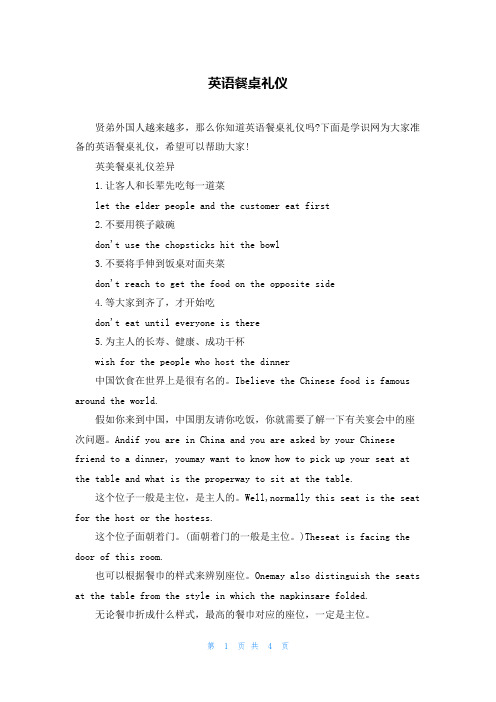
英语餐桌礼仪贤弟外国人越来越多,那么你知道英语餐桌礼仪吗?下面是学识网为大家准备的英语餐桌礼仪,希望可以帮助大家!英美餐桌礼仪差异1.让客人和长辈先吃每一道菜let the elder people and the customer eat first2.不要用筷子敲碗don't use the chopsticks hit the bowl3.不要将手伸到饭桌对面夹菜don't reach to get the food on the opposite side4.等大家到齐了,才开始吃don't eat until everyone is there5.为主人的长寿、健康、成功干杯wish for the people who host the dinner中国饮食在世界上是很有名的。
Ibelieve the Chinese food is famous around the world.假如你来到中国,中国朋友请你吃饭,你就需要了解一下有关宴会中的座次问题。
Andif you are in China and you are asked by your Chinese friend to a dinner, youmay want to know how to pick up your seat at the table and what is the properway to sit at the table.这个位子一般是主位,是主人的。
Well,normally this seat is the seat for the host or the hostess.这个位子面朝着门。
(面朝着门的一般是主位。
)Theseat is facing the door of this room.也可以根据餐巾的样式来辨别座位。
Onemay also distinguish the seats at the table from the style in which the napkinsare folded.无论餐巾折成什么样式,最高的餐巾对应的座位,一定是主位。
各国圣诞节的习俗中英文

各国圣诞节的习俗中英文
圣诞节是西方传统节日,对于基督教信徒较多的国家来说,这个节日具有特别的意义。
小编今天给大家介绍关于各国圣诞节的习俗中英文版的内容,欢迎查看。
各国圣诞节的习俗中英文
Poland(波兰)
For Poles, Christmas Eve is a night of magic when animals are said to talk and people have the power to predict the future. It’s a time for families to gather and reconcile any differences, and to remember loved ones who have gone before them.
对于波兰人来说,平安夜是充满魔力的一夜。
据说动物在这一夜可以与人说话,而人有预测未来的能力。
家人们会在平安夜团聚一堂,调和矛盾,并怀念过世的亲人。
Wigilia (vee-GEEL-yah), which literally means "vigil," or waiting for the birth of Baby Jesus, is considered more important than Christmas Day itself.。
习俗和礼仪作文英文
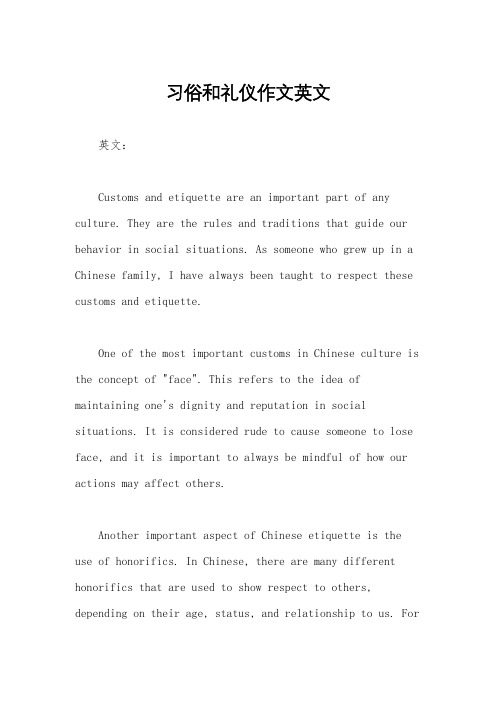
习俗和礼仪作文英文英文:Customs and etiquette are an important part of any culture. They are the rules and traditions that guide our behavior in social situations. As someone who grew up in a Chinese family, I have always been taught to respect these customs and etiquette.One of the most important customs in Chinese culture is the concept of "face". This refers to the idea of maintaining one's dignity and reputation in social situations. It is considered rude to cause someone to lose face, and it is important to always be mindful of how our actions may affect others.Another important aspect of Chinese etiquette is the use of honorifics. In Chinese, there are many different honorifics that are used to show respect to others, depending on their age, status, and relationship to us. Forexample, we use "lao" to address someone who is older than us, and "xiansheng" to address someone who is in a position of authority.In Western culture, there are also many customs and etiquette rules that are important to follow. For example, it is considered polite to hold the door open for someone, or to say "please" and "thank you" when making a request. In business situations, it is important to dress professionally and to arrive on time for meetings.Overall, customs and etiquette are an important part of any culture. They help us to navigate social situations and to show respect to others. By following these rules, we can build strong relationships and create a more harmonious society.中文:习俗和礼仪是任何文化的重要组成部分。
各国不同的礼仪英文作文

各国不同的礼仪英文作文"English:"Different countries have diverse cultural etiquettesand customs when it comes to social interactions, including greetings, dining, and gestures. Understanding and respecting these differences is crucial for effective communication and building relationships across cultures.Let's delve into some examples of these distinct etiquettes from various countries.In Japan, bowing is a common form of greeting and showing respect. The depth of the bow depends on the levelof respect or formality involved. For instance, a slightbow is appropriate for casual greetings among friends,while a deeper bow is used in formal settings or when showing reverence, such as when meeting elders or superiors.On the other hand, in many Western countries like the United States or the United Kingdom, shaking hands is thecustomary way to greet someone. A firm handshake conveys confidence and trustworthiness. However, it's essential to note that cultural nuances exist even within Western countries. For example, in the United States, a firm handshake is generally preferred, whereas in the United Kingdom, a softer handshake is more common.Moving on to dining etiquette, chopsticks are commonly used in East Asian countries like China and Korea. Knowing how to use chopsticks properly is not only practical but also shows respect for the culture. It's considered impolite to stick chopsticks upright in a bowl of rice in China, as it resembles a funeral ritual.In contrast, in Western countries, the use of utensils such as knives, forks, and spoons is prevalent. Table manners vary slightly from country to country, but there are some universal rules, such as keeping your elbows off the table and waiting for everyone to be served before starting to eat.Now, let's switch to Chinese:"中文,"不同国家有着不同的文化礼仪和习俗,包括问候、用餐和手势等方面。
中国传统节日(中英文对照)
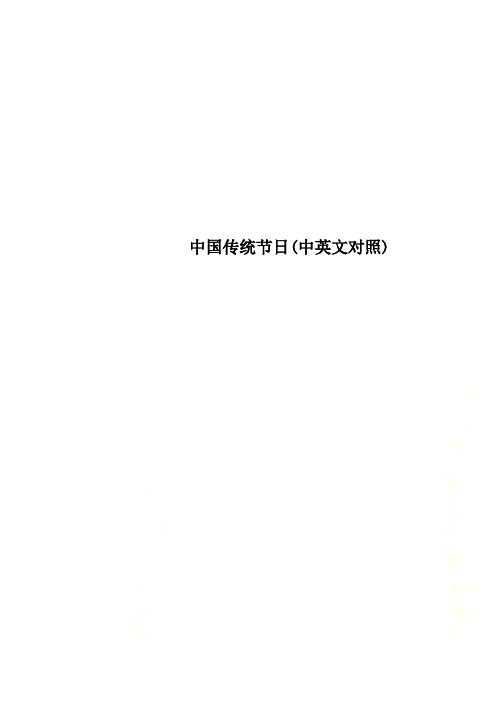
中国传统节日(中英文对照)中国传统节日(中英文对照简介)目录The Spring Festival(春节)Lantern Festival(元宵节)Qingming Festival(清明节)Dragon Boat Festival(端午节)Double Seventh Festival(七夕)Mid-Autumn Festival(中秋节)Double Ninth Festival(重阳节)Winter Solstice Festival(冬至)together to have dinner while watching TV programs.For Chinese at home and abroad, the Spring Festival is always the most important festival.农历的正(zheng)月初一,是中国的农历新年。
在中国的传统节日中,这是一个最重要、最热闹的节日。
因为过农历新年的时候,正是冬末春初,所以人们也把这个节日叫“春节”。
中国人过春节有很多传统习俗。
从腊月二十三起,人们就开始准备过年了。
在这段时间里,家家户户要大扫除,买年货,贴窗花,挂年画,写春联,蒸年糕,做好各种食品,准备辞旧迎新。
春节的前夜叫“除夕”。
除夕之夜,是家人团聚的时候。
一家人围坐在一起,吃一顿丰盛的年夜饭,说说笑笑,直到天亮,这叫守岁。
除夕零点的钟声一响,人们还要吃饺子。
古时候叫零点为“子时”,除夕的子时正是新旧年交替的时候,人们在这时吃饺子,是取“更岁交子”的意思。
这也是“饺子”名称的由来。
过了除夕就是大年初一。
从初一开始,人们要走亲戚、看朋友,互相拜年。
拜年,是春节的重要习俗。
拜年时,大家都要说一些祝愿幸福、健康的吉祥话。
放爆竹是春节期间孩子们最喜欢的活动。
传说燃放爆竹可以驱妖除魔,所以每年从除夕之夜起,到处就响起了接连不断的爆竹声。
阵阵烟花,声声爆竹,给节日增添了喜庆的气氛。
英语作文习俗礼仪
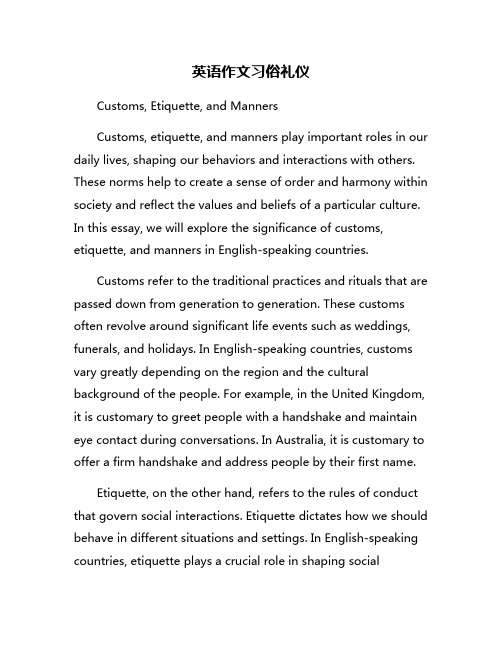
英语作文习俗礼仪Customs, Etiquette, and MannersCustoms, etiquette, and manners play important roles in our daily lives, shaping our behaviors and interactions with others. These norms help to create a sense of order and harmony within society and reflect the values and beliefs of a particular culture. In this essay, we will explore the significance of customs, etiquette, and manners in English-speaking countries.Customs refer to the traditional practices and rituals that are passed down from generation to generation. These customs often revolve around significant life events such as weddings, funerals, and holidays. In English-speaking countries, customs vary greatly depending on the region and the cultural background of the people. For example, in the United Kingdom, it is customary to greet people with a handshake and maintain eye contact during conversations. In Australia, it is customary to offer a firm handshake and address people by their first name.Etiquette, on the other hand, refers to the rules of conduct that govern social interactions. Etiquette dictates how we should behave in different situations and settings. In English-speaking countries, etiquette plays a crucial role in shaping socialinteractions and relationships. For example, it is considered polite to say "please" and "thank you" when making requests or receiving help. It is also important to respect personal space and avoid interrupting others while they are speaking.Manners, on the other hand, refer to the way in which we conduct ourselves in social situations. Good manners are essential for building positive relationships and showing respect towards others. In English-speaking countries, manners are highly valued and are often seen as a reflection of one's character and upbringing. For example, it is important to be punctual for appointments and social gatherings. It is also important to be courteous and considerate towards others, such as holding the door open for someone or offering to help a stranger in need.In conclusion, customs, etiquette, and manners play important roles in shaping our behaviors and interactions with others. These norms help to create a sense of order and harmony within society and reflect the values and beliefs of a particular culture. By understanding and following these norms, we can build positive relationships and promote mutual respect and understanding in English-speaking countries.。
- 1、下载文档前请自行甄别文档内容的完整性,平台不提供额外的编辑、内容补充、找答案等附加服务。
- 2、"仅部分预览"的文档,不可在线预览部分如存在完整性等问题,可反馈申请退款(可完整预览的文档不适用该条件!)。
- 3、如文档侵犯您的权益,请联系客服反馈,我们会尽快为您处理(人工客服工作时间:9:00-18:30)。
习俗礼仪中英文对照.txt如果背叛是一种勇气,那么接受背叛则需要更大的勇气。
爱情是块砖,婚姻是座山。
砖不在多,有一块就灵;山不在高,守一生就行。
Japanese etiquette is based on the Japanese state of mind, education derived through the. Japanese etiquette is characterized by: pay attention to beauty and mood-US movements. Through its own actions to convey to each other in good faith, friendship, respect for others, care and understanding. 日本式礼仪是根据日本人的心境、教养经提炼而成的。
日本式礼节的特点是:讲究动作美和心境美。
通过自身的行动向对方传达真诚、友爱、尊重他人、关心和体谅的心情。
Greetings 问候The Japanese believe that the main greeting greeting action should be. The time greeting each other, the most taboo, or right depending on the eyes squint. With your eyes man marking, it seems that people should see through this practice is seen as impolite action. So, what does the right location. Japan's past, flat head, flat milk (room), flat shoulder view. The most standard practice is to require people to flat head, flat shoulder, flat angle of the composition of milk corners, select the location of the middle of the best visual position. The so-called best part of it is that those who expressed their willingness to listen to each other greeting speech posture. 日本人认为,问候应以动作问候为主。
相互间表示问候的时候,最忌讳眼睛斜视或者对视。
用眼睛盯人,似乎要把人看透,这种做法也被视为失礼的动作。
那么,什么位置合适呢。
日本过去有平目、平乳(房)、平肩的说法。
现在最标准的做法是要求人们将平目、平肩、平乳的角度组成四角,选正中的位置为最佳目视部位。
所谓最佳部位是指问候者表示愿意听对方讲话的姿式。
The standard second-class visual area of about an inch or so away from the flat shoulder and the amount of the Ministry of flat, flat umbilical point of the composition of corners. Select a location can be within the four corners. If you look out of this range, it will cause the other party feel eyes squint. 标准的第二级目视部位为离平肩约一寸左右部与平额、平脐的角度组成四角。
选四角范围内一部位即可。
如果目光脱离这个范围,就会使对方感到目光斜视。
Is a very easy conversation between the two sides, if one side of the eye from the visual part of the second level, but also make the other feel rude. If a crowded place, far to find his friend, can be gently raised his hands and waved to each other. If the person was found, it should be looking at a distant friend, say a few words of greeting.就是在双方进行十分轻松的谈话时,如果有一方的目光脱离第二级目视部位,也会使对方感到失礼。
如果在人群拥挤的地方,远远地发现了自己的朋友,可轻轻举起手来,向对方招手致意。
如果对方发现,就应看着远处的朋友,讲一些问候的话。
Bumping into an acquaintance, when the important ritual action far more than speech. The most common is the Shi pike ceremony. If the relationship is very close, but also Shi hands or patting ceremony. In short, the salute must first consider the other side before with their affinities. The handshake, the handshake between men and women should be first reached for the woman. Seniors and juniors between the younger generation should first reach out. "Thank you", "Good-bye", "yes", "Good Morning", "Good Night", "I'm sorry", "Please" is a frequently used courtesy of the Japanese language.熟人打照面的时候,礼仪动作的重要远远超过致词。
最常见的是施屈体礼。
如果双方关系甚密,还可施握手礼或者拍拍肩膀。
总之,施礼之前必须首先考虑对方与自己的亲疏关系。
就握手而言,男女之间握手,应由女方首先伸手。
前辈、晚辈之间,则应晚辈首先伸手。
“谢谢”、“再见”、“是”、“早安”、“晚安”、“对不起”、“请”是日本人经常使用的礼貌语言。
Japanese population is almost no one ever Wuzhou. It appeared only in recent years, "he" and "her" argument. Under normal circumstances, honorifics completely replaced by the person. Therefore, the proper use of honorifics is essential for the Japanese. In principle, to talk about the relationship between themselves or with their closest person to use self-deprecating language. On the relationship with each other when close to people and seniors to use honorifics. Those who respectfully and indiscriminate use of honorifics, or even making things when I use the honorific others who would be regarded as lacking in upbringing. It can be said whether the proper use of language in Japan is often judge a person uneducated important basis. With acquaintances in the middle of the road or at the station ticket gate to talk about long-distance, on the tram for their acquaintances to let others are rude the performance of your seat. In public places, the Japanese stressed the need to first consider the "Do not trouble to others." Therefore, people often talk about looking for long-distance call or not to influence others to walk the roadside location. In addition, not only consider their own, regardless of the other, a taste to talk a Mei Wan. Japanese think it is a lack of respect for the performance of others. 日本语口浯中几乎没有人称。
只是近年来才出现了“他”与“她”的说法。
在一般情况下,敬语完全取代了人称。
因此,正确使用敬语对于日本人来说至关重要。
原则上谈自己或者与自己关系亲近的人时要用自谦语。
